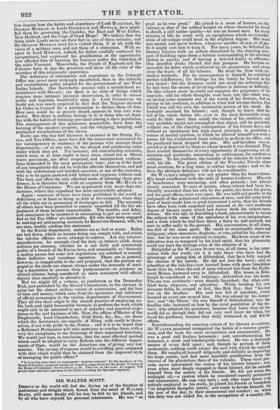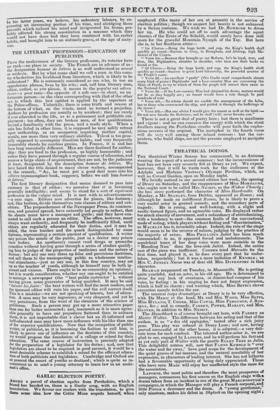SIR WALTER SCOTT.
DEEPLY as the world will feel the drying up of the fountain of instruction and delight which flowed from the mind of WALTER SCOTT, still more deeply will his loss be felt by his friends, and by all who have enjoyed his personal intercourse. He was " as good as he was great." He joined to a sense of honour, as chi- valrous as that of the noblest knight on whose character he loved to dwell, a still nobler quality—he was an honest man. In every relation of life, he acted with an uprightness which no consider- ation of advantage could bend in the slightest degree. His word was sacred, and never broken, whatever sacrifice of ease or of pro- fit it might cost him to keep it. For many years, he followed his literary labours with an ardour stimulated by the cheering pros_ pect of building upon them a fortune corresponding to his elevated station in society, and of leaving a beloved family in affluence. One dreadful stroke blasted this fair prospect. He became se_ sponsible for debts which swallowed up his possessions, and swept away the fruits of all his labours. He stood the blow with un- shaken fortitude. For its consequences to himself, he exhibited perfect indifference; his feelings for his family he buried in his own breast : but his firmness could not stand the reflection that he had been the means of involving others in distress or difficulty. On this subject alone he could not suppress the poignancy of his anguish; and his whole thoughts were bent, not, like other men, on saving some remnant out of the wreck of his fortune, but oss giving to his creditors, in addition to what had become theirs, that which was still his own, the inalienable powers of his mind. Re instantly resumed his labours ; and, though he knew that the toil of his whole future life, even in the most favourable event, could do little more than satisfy the claims of his creditors, and very probably might not accomplish that object, still he persisted, without one of the cheering anticipations of his former days, and without an incitement but high moral principle, in pursuing a course of mental exertion, in which he allowed himself not even a pause, till his eerlaboured brain refused to perform its office, and his paralysed hand dropped the pen. His self-devotion was re- ceived as it deserved by those so whose benefit it was directed. They have availed themselves of every opportunity of expressing an ad- miration and gratitude, amounting to enthusiasm, for conduct so sublime. To his creditors, the benefits of his labours do not cease with his life. The great edition of the Waverley Novels alone must continue, for a long time, to realize large sums; and we be- lieve the ultimate deficiency will not be considerable.
Sir WALTER'S integrity was not greater than his benevolence. His heart overflowed with the milk of human kindness. His acts of beneficence were unceasing, and often princely ; but always closely concealed. To men of genius, whose talents had been less liberally rewarded than his own by the public, his heart, his purse, and his good offices, were ever open. He was mild and gentle in his judgment of the actions and characters of men; and the same kind- ness of heart made him so good-humoured a critic, that his friends have often been both surprised and amused at the very moderate degree of literary merit which had drawn forth his ardent enco- miums. He was apt, in describing a book, unconsciously to invest the subject with some of the splendour of his own imagination; and a work which he had thus taken a fancy to, and praised, was sure to suffer sadly in the perusal. His conversation, at all times, was full of the same spirit. He could be occasionally stern and indignant, when meanness, duplicity, or vice, called for his observa- tion: but he was never satirical or caustic. His keen sense of the ridiculous was so tempered by his kind spirit, that his pleasantry could not hurt the feelings even of the subjects of it.
Delightful as Sir WALTER SCOTT was, at all times, in his inter- course with the world, yet it is only those who have had the advantage of seeing him at Abbotsford, that have fully enjoyed the charms of his society. He did not love the town ; and no schoolboy at the holydays ever hurried home with more breathless haste than he, when the end of term released him from the Parlia-
ment House, hastened away to Abbotsford. His house in Edin- burgh he considered as his lodgings ; Abbotsford was his home.
The one was carelessly—even meanly furnished; the other exhi- bited taste, elegance, and splendour. While treading his own pleasant fields, he seemed to feel, like Rob Roy, that "his foot was on the heather." His soul was full of sunshine, which
beamed on every one around him. He was adored by his domes- tics ; and "the Shirra " (he was Sheriff of Selkirkshire) was the
familiar title bestowed on him by the rural population of the dis- trict; who admired his greatness, because they knew that all the world did so, though they did not very well know for what, but loved his goodness, because they daily witnessed it, and felt its effects.
Notwithstanding the amazing extent of his literary avccations, Sir WALTER. possessed unimpaired the habits of a country gentle- man, and the taste for rural occupations and amusements. II.e
was a good and fearless horseman ; and, notwithstanding his lameness, a stout and indefatigable walker. He was a thorough master of every field sport ; and, though he partook of them
moderately, nothing could exceed, the zest with which he enjoyed them. He employed himself diligently and skilfully in improving
his large estate; and had more heartfelt gratification from the success of his plantations than of his volumes. These rural pur- suits never interrupted the course of his literary labours ; nor, even when most deeply engaged in these labours, did be seclude himself from the society of his friends. He did not waste the midnight oil,—a custom which he considered equally pernicious and unnecessary. He rose very early ; and, after some hours veil' actively employed in his study, he joined his friends at breakfast "on hospitable thoughts intent," and ready to devote himself, for the rest of the day, to their amusement and comfort; or, when this duty was not called for, to the occupations of a country In his latter years, we believe, his sedentary labours, by en- grossing an increasing portion of his time, and abridging those pursuits winch unbent his mind and invigorated his frame, pro- bably affected his strong constitution in a manner which they would not have done had they been combined with his earlier habits, and brought him to an untimely grave, at the age of sixty- one.



















































 Previous page
Previous page